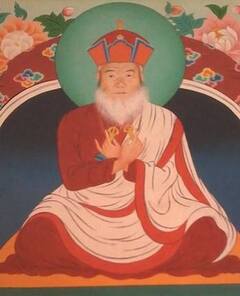Guru Yoga
༄༅། །བླ་མའི་རྣལ་འབྱོར་ཉུང་ཟབ་བཞུགས་སོ། །
A Profound and Concise Guru Yoga
by Chatral Rinpoche
སྐྱབས་འགྲོ་ནི།
Take refuge:
སྐུ་གསུམ་བརྒྱུད་པ་དགུ་ལྡན་ལྷག་པའི་ལྷ། །
ku sum gyüpa guden lhakpé lha
Trikāya master with ninefold lineage,1 and sovereign
རབ་འབྱམས་ཞི་ཁྲོའི་ཁྱབ་བདག་ཌཀྐིའི་རྗེ། །
rabjam zhitrö khyabdak daki jé
Of yidams, countless peaceful-wrathful ones, and ḍākinīs,
རྡོ་རྗེ་འཆང་དབང་དཔལ་ལྡན་འཁོར་ལོའི་མགོན། །
dorjé chang wang palden khorlö gön
Lord Vajradhara, glorious protector of the maṇḍala,
སྙིང་ནས་སྐྱབས་མཆི་ཐུགས་རྗེས་བརྩེར་དགོངས་གསོལ། །
nying né kyab chi tukjé tser gong sol
From the depths of my heart I go to you for refuge—
Please listen with love and compassion!
ལན་གསུམ།
Three times.
སེམས་བསྐྱེད་ནི།
Generate bodhicitta:
མཐའ་ཡས་ཁམས་གསུམ་སྐྱེ་འགྲོ་འཁོར་མཚོ་བསྒྲལ། །
tayé kham sum kyendro khor tso dral
To rescue all beings from the ocean of saṃsāra’s three realms,
མྱུར་དུ་བླ་མེད་བྱང་ཆེན་ལ་འགོད་ཕྱིར། །
nyurdu lamé jang chen la gö chir
And lead them swiftly to unsurpassed, great awakening,
བདག་གིས་བྱིན་རླབས་བླ་མའི་རྣལ་འབྱོར་ལ། །
dak gi jinlab lamé naljor la
I will immerse myself in the blessings of guru yoga
འཇུག་ཅིང་སེམས་བསྐྱེད་བསླབ་ལ་གནས་པར་བྱ། །
juk ching semkyé lab la nepar ja
And continuously cultivate bodhicitta, the awakened heart!
ལན་གསུམ།
Three times.
ཨ། རང་སེམས་མ་བཅོས་སྟོང་གསལ་འགག་མེད་རྩལ། །
ah, rangsem machö tong sal gakmé tsal
Ah! The unceasing expression of natural mind, empty yet clear,
ཅིར་ཡང་འཆར་བའི་དཔལ་ལྡན་བླ་མ་ནི། །
chiryang charwé palden lama ni
Is the glorious guru, who appears in every possible way.
སྤྱི་བོར་སེང་ཁྲི་པད་ཉི་ཟླ་གདན་སྟེང་། །
chiwor sengtri pé nyida den teng
You rest upon my crown, on a lion throne, lotus, sun and moon—
དྲན་མཆོག་མགོན་པོ་སངས་རྒྱས་རྡོ་རྗེ་རྩལ། །
dren chok gönpo sangye dorjé tsal
Supreme remembrance, Lord Sangyé Dorjé Tsal.
དཀར་དམར་ཁྲོ་འཛུམ་རྣལ་འབྱོར་སྤྱོད་ཚུལ་འཆང་། །
kar mar tro dzum naljor chö tsul chang
Your face is ruddy white, fiercely smiling, as you take on a yogi’s appearance,
འདུང་མ་དམར་པོ་དྲི་མེད་རས་གཟན་གསོལ། །
dungma marpo drimé ré zen sol
Wearing a red cloak and an upper robe of unblemished white.
དབུ་ལ་འདབ་ལྡན་པད་ཞྭའི་ཅོད་པན་མཛེས། །
u la dabden pé zhé chöpen dzé
Your head is adorned by a lotus-petalled crown,
ཐབས་ཤེས་ཕྱག་གཉིས་མཉམ་བཞག་མཆོག་སྦྱིན་གྱིས། །
tabshé chak nyi nyamzhak chok jin gyi
And both hands, means and wisdom, are in mudrās of generosity and equipoise.
རྡོ་རྗེ་དྲིལ་འཛིན་ཟུང་འཇུག་བརྡ་ཆོས་སྟོན། །
dorjé dril dzin zungjuk da chö tön
They hold a vajra and bell, symbolizing unity.
འགྱིང་བག་བདེ་སྟོང་ཉམས་འབར་རོལ་སྟབས་བཞུགས། །
gying bak detong nyam bar rol tab zhuk
You sit majestically in the revelling pose as the experience of empty-bliss blazes.
ཕྱོགས་མཚམས་བར་སྣང་འཇའ་འོད་ཐིག་ལེའི་ཀློང་། །
choktsam barnang ja ö tiklé long
Within spheres of rainbow light that fill the sky in all directions,
རབ་འབྱམས་རྩ་གསུམ་རྒྱ་མཚོ་སྤྲིན་ལྟར་གཏིབས། །
rabjam tsa sum gyatso trin tar tib
A boundless ocean of the three roots gather like clouds.
སྐྱབས་ཡུལ་དགུ་ཕྲུགས་ངོ་བོ་བླ་མ་ཉིད། །
kyabyul gu truk ngowo lama nyi
You, guru, are the quintessence of infinite sources of refuge;
ཡིན་པར་ཐག་ཆོད་དད་མོས་དྲག་པོ་ཡིས། །
yinpar takchö dé mö drakpo yi
Of this I am certain, and in this I have total trust.
སྙིང་ནས་གུས་ཤིང་གདུང་བས་གསོལ་འདེབས་ན། །
nying né gü shing dungwé soldeb na
With heartfelt devotion and longing I call upon you—
བྱིན་རླབས་འཕོ་བའི་དབང་བཞི་དུས་འདིར་སྩོལ། །
jinlab powé wang zhi dü dir tsol
Please grant the four empowerments and bestow your blessings!
ཨོཾ་ཨཱཿབུདྡྷ་བཛྲ་ཧཱུྃ།
om ah buddha benza hung
oṃ āḥ buddha vajra hūṃ
བླ་མ་འོད་ཞུ་རང་ཐིམ་ཐུགས་ཡིད་འདྲེས། །
lama ö zhu rang tim tuk yi dré
The guru melts into light, dissolves into me, mind and wisdom merge—
ཡེངས་མེད་བྱ་རྩོལ་བྲལ་བའི་རྫོགས་པ་ཆེ། །
yengmé jatsol dralwé dzogpa ché
Undistracted and free from effort, this is the great perfection.
སངས་རྒྱས་ཀུན་གྱི་དགོངས་ཀློང་བདེ་ཆེན་པོ། །
sangye kün gyi gong long dechen po
The great bliss of all the buddha’s wisdom vastness,
དཔལ་ལྡན་རྡོ་རྗེ་སེམས་དཔའ་བདག་འགྲུབ་ཤོག །
palden dorjé sempa dak drub shok
Glorious Vajrasattva, may I realize you!
ཅེས་དག་སྣང་ཅན་དུ་མས་ནན་བསྐུལ་ངོ་མ་ཆོག་པར་ཁོ་བོ་རང་བསྒོམ་བྱར་བཀོད་པའི་བླ་མའི་རྣལ་འབྱོར་ཉུང་ངུ་འདིའང་། སྤྱིར་བདག་ལྟ་བུའི་སྙིགས་དུས་ཀྱི་བླ་གཟུགས་གདོལ་སྤྱོད་སྙོམས་ལས་མཁན་སོ་སྐྱེའི་རང་བཞིན། རྣལ་འབྱོར་དུ་བསྒོམ་པར་འོས་པའི་ཕྱི་ནང་གི་ཡོན་ཏན་ཏིལ་འབྲུ་ཙམ་མ་མཆིས་ཀྱང་། མཆོག་གི་རྡོ་རྗེ་འཛིན་པ་རྣམས་ཀྱིས་དགྱེས་བཞིན་རྗེས་སུ་བཟུང་ཞིང་དགོངས་པ་གཏད་པའི་སྐལ་བ་བཟང་པོ་ཐབས་ནས་བྲིས་པ་ལ། རྩ་བརྒྱུད་བླ་མ་རྣམས་ཀྱི་ཐུགས་རྗེ་བྱིན་རླབས་ཀྱིས་བདག་ལ་སྒྲིབ་པར་མི་འགྱུར་ཞིང་། དད་མོས་ཅན་ལ་འདོད་འབྲས་བསླུ་མེད་འབྱུང་བར་ཤོག་ཅིག །
As many with pure perception insisted, and so unable to resist, I wrote this concise guru yoga so they could meditate upon me, an ordinary, lazy man with boorish behaviour. I have only the appearance of a guru in this degenerate age; I lack even a sesame seed’s worth of the outer or inner qualities upon which you could meditate as a “yoga.” And yet I have been graciously cared for by supreme vajra masters, and they put their trust in me. In this I am fortunate, and because of them this was written. May the compassion and blessings of the root and lineage gurus prevent any obstacles that might come from writing this, and may the desired results arise without fail for those with faith and devotion.
| Samye Translations, 2019. (Translated by Peter Woods, Nick Schmidt and Stefan Mang.)
Version: 1.2-20230405
- ↑ The nine lineages of the Nyingma tradition: 1) the mind-direct lineage of the victorious ones (rgyal ba dgongs), 2) the sign lineage of the vidyādharas (rig 'dzin brda), 3) the aural lineage of realized beings (gang zag snyan), 4) the ḍākinī’s seal of entrustment lineage (mkha' 'gro gtad rgya), 5) the lineage empowered by aspiration (smon lam dbang bskur), 6) the lineage of prophetically declared succession (bka' bab lung bstan), 7) the lineage of yoga siddhis (dngos grub rnal ‘byor), 8) the lineage of blessed samaya substances (byin rlabs dam rdzas), and 9) the written lineage of yellow parchments (tshig brgyud shog ser). While 1)-3) remain constant, listings of the following six lineages vary. Following Dan Martin, this list is drawn from Mkhyen rab rgya mtsho 1557 (1981) 256.4.
